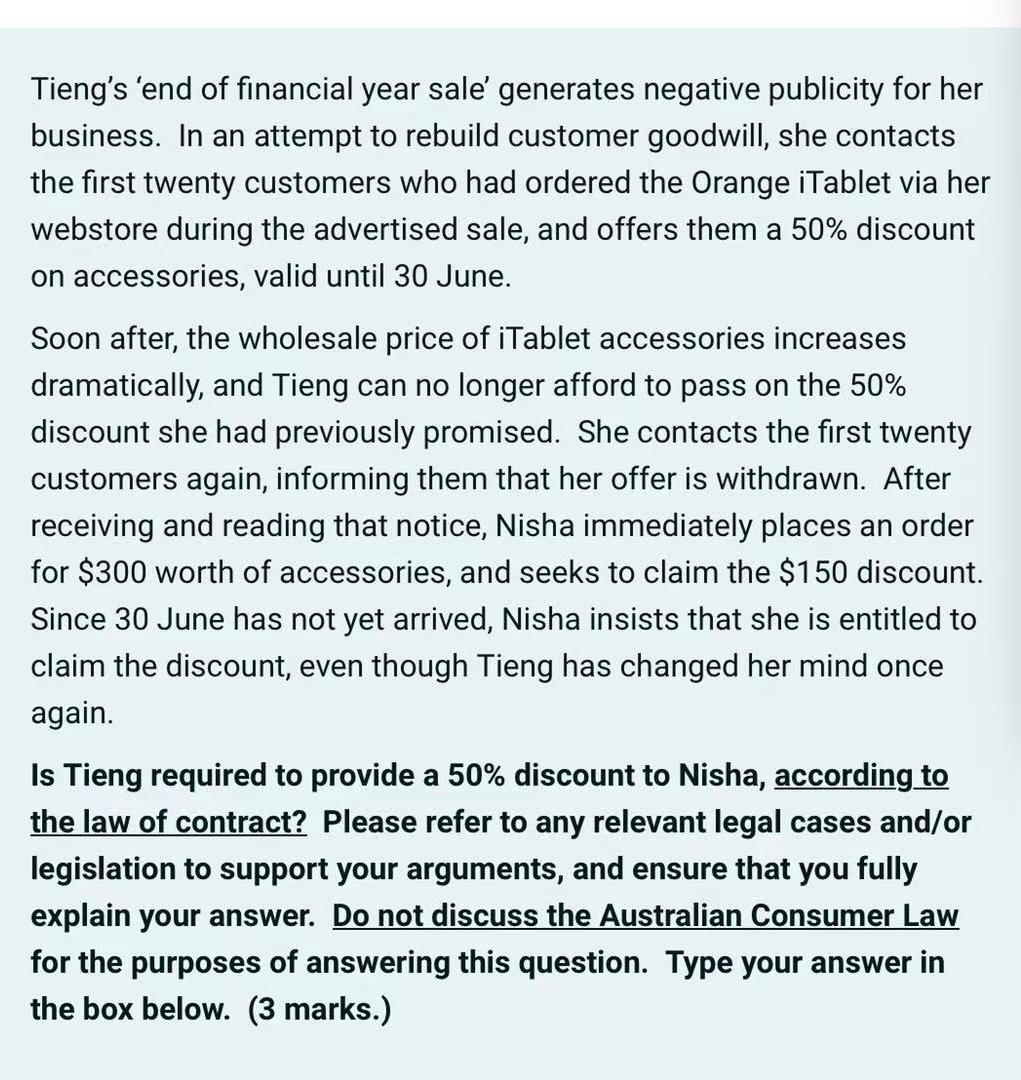Tieng operates a webstore selling consumer electronics, including tablets. On 31 May she advertises an end of financial year sale via social media,email newsletters, and her website. The sale advertisements include the new Orange iTablet, for a special introductory price of $599 (rather than $799),'available to the first twenty customers placing webstore orders after 12:01AM on 14 June'. On 7 June, Tieng changes her mind about the discount, but doesn't change her advertisements. On 14 June, she charges all customers (including the first twenty) the regular $799 price for the Orange iTablet. Nisha,who placed the first order in the webstore at 12:05AM on 14 June, is unhappy about being charged full price. She complains,and argues that Tieng is legally required to sell her an Orange iTablet for$599.

Tieng's 'end of financial year sale' generates negative publicity for her business. In an attempt to rebuild customer goodwill, she contacts the first twenty customers who had ordered the Orange iTablet via her webstore during the advertised sale, and offers them a 50% discount on accessories, valid until 30 June. Soon after, the wholesale price of iTablet accessories increases dramatically, and Tieng can no longer afford to pass on the 50% discount she had previously promised. She contacts the first twenty customers again, informing them that her offer is withdrawn. After receiving and reading that notice, Nisha immediately places an order for $300 worth of accessories, and seeks to claim the $150 discount. Since 30 June has not yet arrived, Nisha insists that she is entitled to claim the discount, even though Tieng has changed her mind once again. Is Tieng required to provide a 50% discount to Nisha, according to the law of contract? Please refer to any relevant legal cases and/or legislation to support your arguments, and ensure that you fully explain your answer. Do not discuss the Australian Consumer Law for the purposes of answering this question. Type your answer in the box below. (3 marks.) Tieng's 'end of financial year sale' generates negative publicity for her business. In an attempt to rebuild customer goodwill, she contacts the first twenty customers who had ordered the Orange iTablet via her webstore during the advertised sale, and offers them a 50% discount on accessories, valid until 30 June. Soon after, the wholesale price of iTablet accessories increases dramatically, and Tieng can no longer afford to pass on the 50% discount she had previously promised. She contacts the first twenty customers again, informing them that her offer is withdrawn. After receiving and reading that notice, Nisha immediately places an order for $300 worth of accessories, and seeks to claim the $150 discount. Since 30 June has not yet arrived, Nisha insists that she is entitled to claim the discount, even though Tieng has changed her mind once again. Is Tieng required to provide a 50% discount to Nisha, according to the law of contract? Please refer to any relevant legal cases and/or legislation to support your arguments, and ensure that you fully explain your answer. Do not discuss the Australian Consumer Law for the purposes of answering this question. Type your answer in the box below. (3 marks.)







